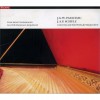Composers
Johann Abraham Peter Schulz (March 31, 1747 in Lüneburg – June 10, 1800 in Schwedt) was a German musician and composer. Today he is best known as the composer of the melody for Matthias Claudius's poem "Der Mond ist aufgegangen" and the Christmas carol "Ihr Kinderlein kommet".
Schulz attended the Michaelis School from 1757 to 1759 and then the Johanneum in Lüneburg from 1759 to 1764. In 1765, he was the student in Berlin of composer Johann Kirnberger, and then taught in Berlin himself.[1] He served as the conductor of the French Theatre in Berlin from 1776 to 1780 and from 1780 to 1787 he was the Kapellmeister of Prince Henry in Rheinsberg. Schulz then went on to serve as Court Kapellmeister in Copenhagen from 1787 to 1795 before returning to Berlin.
Schulz wrote operas, stage music, oratorios, and cantatas, as well as piano pieces and folk songs. Furthermore, he also wrote articles on music theory for Johann Georg Sulzer's (1720–1779) Allgemeine Theorie der schönen Künste in four volumes.
Refine by search
view allBiography
Johann Abraham Peter Schulz (March 31, 1747 in Lüneburg – June 10, 1800 in Schwedt) was a German musician and composer. Today he is best known as the composer of the melody for Matthias Claudius's poem "Der Mond ist aufgegangen" and the Christmas carol "Ihr Kinderlein kommet".
Schulz attended the Michaelis School from 1757 to 1759 and then the Johanneum in Lüneburg from 1759 to 1764. In 1765, he was the student in Berlin of composer Johann Kirnberger, and then taught in Berlin himself.[1] He served as the conductor of the French Theatre in Berlin from 1776 to 1780 and from 1780 to 1787 he was the Kapellmeister of Prince Henry in Rheinsberg. Schulz then went on to serve as Court Kapellmeister in Copenhagen from 1787 to 1795 before returning to Berlin.
Schulz wrote operas, stage music, oratorios, and cantatas, as well as piano pieces and folk songs. Furthermore, he also wrote articles on music theory for Johann Georg Sulzer's (1720–1779) Allgemeine Theorie der schönen Künste in four volumes.




